Dunkirk clearly shows Hitler worked for Jews
mardi 11 juin 2013
Hitler and Dunkirk: it was not a mistake
The case of Dunkirk is one of those which show the most clearly that Hitler was a jew working for Jewish leaders.Even when I still believed Hitler was for real, I couldn't understand his reaction about Dunkirk. It was a big logical hole in the WWII story. And the official explanation about Hitler wanting to be friend with England didn't hold one second.
For those who don't know, France and England declared war to Germany the 3rd of September 1939, after the invasion of Poland by Hitler's armies. But the real war between France/England and Germany began only May 10 1940, when Hitler invaded France and Belgium.
At the end of May, the situation was the following:
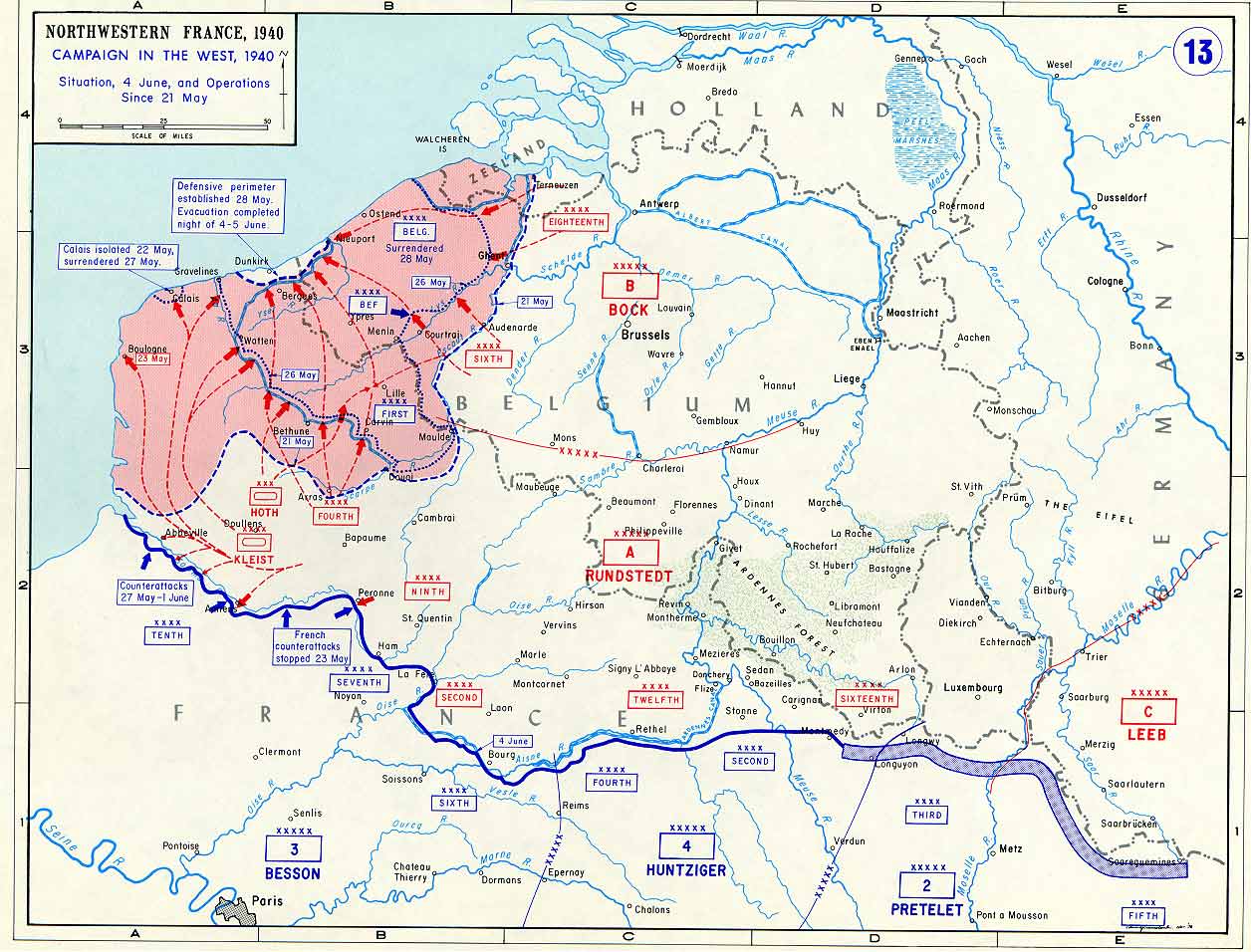 In May 21, 230.000 British soldiers and around 180.000 French soldiers were separated from the rest of the Allied army (in the red zone of the map). The 26, they began to retreat toward Dunkirk. The 28, the pocket of resistance was now only 37 km long (Dunkirk to Nieuport) and 9km large at best (Beaches to the space before Bergues). There were 800.000 German soldiers against the 410.000 Allied soldiers.
In May 21, 230.000 British soldiers and around 180.000 French soldiers were separated from the rest of the Allied army (in the red zone of the map). The 26, they began to retreat toward Dunkirk. The 28, the pocket of resistance was now only 37 km long (Dunkirk to Nieuport) and 9km large at best (Beaches to the space before Bergues). There were 800.000 German soldiers against the 410.000 Allied soldiers.
There were two moments in which the decisions of Hitler allowed Allied forces to flee: between the 24 and the 26, and between the 28 and the 4.
- Between the 24th and the 26th of May
On the map, something is confusing. It is said that the front was on the Aa canal the 26th of May. But what is not clear is if the front was there before the 26 or if it was there just the 26. In fact, with Liddell Hart's book "History of the Second World War" (1970), we learn that it's the first case. The front was there between the 23 and the 26. In fact, the 23, German troops were already on the other side of the Aa canal. Many bridges hadn't been dynamited. Thus, Germans were able to cross the canal. Between Graveline and Saint-Omer (30 km), there was only one British battalion (that is, between 300 and 1200 soldiers). They had almost no antitank weapons (there were a lot of German tanks on this part of the front). And the line between Graveline and 10 km after Bethune (75 km) was not better defended. As Germans had the air superiority and the land was very flat, with just fields, Allied forces couldn't hide. So, German generals and Hitler knew that there was nearly nobody to defend this zone. Allied troops hadn't already retreated in Dunkirk and on the beaches. Nothing could prevent Germans to invade the zone and to block the road toward Dunkirk.
If they had done it, Allied forces would have been unable to escape by the sea. But the 24, Hitler ordered the German forces to stop right there. As they were at only 15 km of Dunkirk, chiefs of panzers bombarded their superiors with questions. But they were answered it was a direct order from the Fuhrer. So, during 3 days, the German troops did nothing. And the Allied forces used this time to flee toward Dunkirk. The 26, Germans finally move toward Dunkirk, but it was too late. Allies had already fled.
- Between the 28th of May and the 4th of June
The 27, the evacuation of British troops began. But, before the 29, only 25.000 soldiers had been evacuated.
So, the 26, it was totally clear that the British army was going to be evacuated by sea, and thus, that they were completely defeated. They were now in a very thin space. They had lost. It was over.
Between May 28 and June 4, Hitler could prevent them from escaping by boats. He had several tools to do that.
- Cannons
First of all, German forces could have used their cannons in order to destroy a lot of boats and the jetty (by which 2/3 of the soldiers were able to flee), and to kill lots of soldiers who were without any protection on the beaches and in the port of Dunkirk.
During World War II, anti-personnel artillery munition called shrapnel (a shell full of marbles, exploding in the air, and awfully efficient against troops exposed on a flat land) had been replaced by high explosive shells (it was still used by aircrafts though). This one had an even more awful result because the fragments were bigger and were sent further. So, if Hitler had wanted to, he could have made a massacre by sending shrapnels on the beaches and on the port of Dunkirk. Of course, some could say that Hitler didn't want to kill so many men (because he was a noble man, or because he wanted to keep a good relationship with England). But then, why use his aircrafts to machine-gun the troops which were on the beaches? Why sink all those boats which had many men inside them (5000 soldiers perished in the boats)? And he could have done that just on the beaches and the port, in order to forbid the evacuation, but give them the possibility of going to the inner land.
During the battle of Verdun (World War I), there were 1 million shells used each day. Imagine such a quantity of shells used on the 400.000 unprotected soldiers of Dunkirk.
It is said that half of Dunkirk was destroyed. But, in fact, only 6.000 men were killed on the land (plus 5000 on the sea. So, a total of 11.000 men). With 410.000 men in the small town of Dunkirk and on the beaches, without any protection, you would expect to have at least 100.000 dead. But no, only 6.000.
Some images show that cannons almost weren't use at all on the beaches:
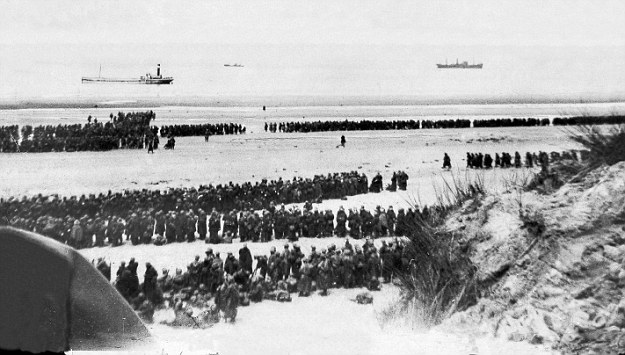
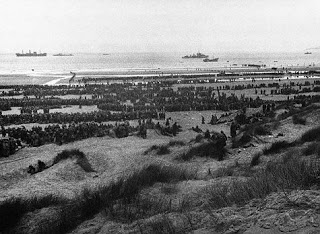
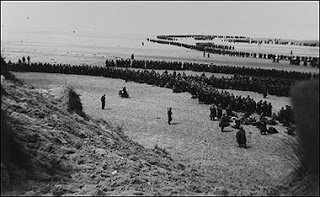 Where are the dead soldiers? Where are the holes from explosions? And if there were so many shells sent on the beach, why are the soldiers standing up? They should be lying on the ground, in order to avoid the numerous explosions. They didn't because there were nearly no explosions.
Where are the dead soldiers? Where are the holes from explosions? And if there were so many shells sent on the beach, why are the soldiers standing up? They should be lying on the ground, in order to avoid the numerous explosions. They didn't because there were nearly no explosions.
Churchill said that as shells ended up in the sand, many of them didn't exploded. But Germans weren't stupid. They knew that. So, they would have use shells with retardant, not just shells which explode at the impact.
Others photos are also interesting:
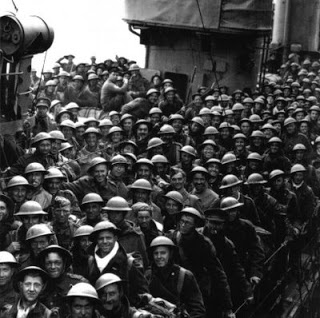
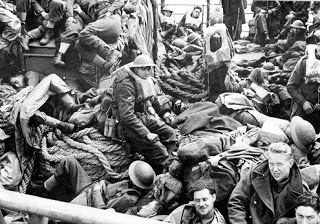
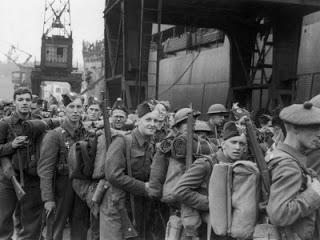 Is this faces of men who have just escaped an apocalypse of bombs on the beaches or in the port, or the faces of men who escaped quietly? They don't seem to be very stressed or traumatized.
Is this faces of men who have just escaped an apocalypse of bombs on the beaches or in the port, or the faces of men who escaped quietly? They don't seem to be very stressed or traumatized.
- Aircraft
About the aircraft, there are several points to consider.
The air supremacy: it is said that the Luftwaffe had the air superiority. But it is also said that on this very battle the Royal Air Force was able to be sometimes stronger than the Luftwaffe. It is very dubious that suddenly, the RAF was superior. Liddell Hart gives the reason why the RAF was able to more or less outperform the Luftwaffe (sometimes). In fact, the Luftwaffe sent only few aircraft compared with what it could have done; once again because of a direct order from Hitler. What was planned was that the Luftwaffe would be completely in charge of preventing the Allied force from fleeing. But finally, because of this decision from Hitler, the Luftwaffe could not do much.
The weather: it is said that during several days, the weather was not very good. Thus, German airplane could be used against Allied forces only the 27, the 29 and the 1st of June (Germans had the air supremacy), so, only 3 days on the 8 days.
But, even the 29 and the 1st of June, tons of British soldiers were able to escape (47.000 and 64.000: two of the four best days, on a total of 9 days). So, even when the Luftwaffe was able to attack, it doesn't seem much was done. But as we have seen, Hitler ordered the Luftwaffe to use only a little part of his forces. This is why so many soldiers were able to escape during those days.
However, this story about the changing weather seems dubious. The problem is it is said that the sea was perfectly calm during those 8 days. Historians say it explains a part of the success of the operation Dynamo. So, how could the sea be so calm when besides, the weather was changing so often?
Some could say that the weather was not changing so much but was passing from a little bit cloudy to more cloudy. That would explain why there wasn't much wind. But there are photos of soldiers on the beach and on the jetty, and the weather seems very beautiful. For example, this one:
Thus, the weather was passing from sunny to cloudy, and this, in just one day. Then, how could there be so little wind and how could the sea be so calm? So, what is probable is that the weather was quite fine during most of the time, and the Luftwaffe could attack without problem. But the story about the weather has been modified in order to justify the fact that Hitler used the Luftwaffe so little; and then to avoid adding a fishy behavior to the other ones.
Something else supports the idea that the weather was not so bad. It is generally added that the smoke from the fires in Dunkirk participated to the fact that the Luftwaffe could not attack. But the fires wouldn't have been able to prevent the airplanes from attacking the beaches, the jetty, and the boats. And there was no fires on the beaches (you don't see ones on the photos). So, why did they give this precision about the fire? This is because, as the liars were conscious that the weather was not so bad, they felt that they had to add the problem of the fire in order to give more consistency to the initial lie.
And where the port is located, the town itself (where there are the houses and buildings) is quite far away. So, in the port, the smoke from the fire would have been too far to disturb the German airplanes.
And as there was no rain, as the goal was well identified (and immobile), and as the Luftwaffe was not far from it, clouds should not have been a problem. They could have even allowed the Luftwaffe to hide in them before bombing Dunkirk and the beaches.
And on this site, there are reports of air attacks from the Luftwaffe on other days that the 27, the 29 and the 1. You find for example that the 28, the French Minesweeper Mimi Pierrot was sunk by the Luftwaffe. And at 12h30, the destroyer Brighton Belle touches a wreck during an attack form the Luftwaffe. The 30, the British malles (boats which allowed people to cross the channel during peacetime) Clan Mac Alister and Mona's Queen are sunk by the Luftwaffe, and the minesweeper Devonia is damaged. The 31, the Dutch boat Horst is damaged by the German airplanes. The 2, the French coaster Francois Tixier escapes a bombing from German airplanes. Two hospital boats, the Paris and the Worthing are attacked by the Luftwtaffe. The first one is sunk and the second is damaged. So, the 28, the 30, the 31, and the 2, the weather was not so bad and the German airplanes were able to fly.
This is why Liddell Hart doesn't talk about problems of clouds or fires, or about the fact that miraculously the RAF was suddenly superior to the Luftwaffe, in order to explain the fact that the Luftwaffe didn't made much damages to the Allied forces. He knew that those explanations were phony. This is why he says clearly that in fact, it's Hitler who ordered the Luftwaffe to attack just a little bit: "we have also the proof that the Luftwaffe wasn't used with all the intensity and the energy which would have been possible. And some of the heads of the Luftwaffe say that once again the slow-down came from Hitler".
So, if the Luftwaffe had been used properly, no boat could have approached the shores. As most of the boats were small and didn't have any armor, aircrafts could have sunk most of them. As the boarding was made only in certain places (2/3 in the port and 1/3 on the beaches), they could have thrown bombs on the shore to prevent soldiers from embarking and boats from approaching the shore. They could have destroyed the jetty. The escape plan would have been a nightmare and would have been stopped.
-
U-boots and S-boots
Liddell Hart says that the Kriegsmarine did little use of the U-boats and the S-boats ("Fortunately, the German navy did little to attempt to operate with either u-boot or with speedboats").
But, it's true that there are counter arguments. The German navy had only 18 speeboats (each had 4 torpedoes). 9 were used at Dunkirk between the 28 and the 4th of June. So, we can't say that Germany didn't use their S-boats, quite the contrary. And they were able to sink around 5 boats (the Siroco, the Abukir, the Stella Dorado , the Argyllshire, the HMS Wakeful; attacked but not sunk: the Cyclone) . At first sight, it's not too bad.
But as there were tons of boats, and as their way was well known by the Germans, they could have sunk much more than that. They could attack by night and go back at full speed without being seen at any time (it's how the HMS Wakeful was sunk). With this kind of advantage, they could have sunk many more boats (may be 20 or 30). So, finally Liddell Hart is quite right: the German navy did little attempt to use them. And it was most probably a decision from Hitler.
The U-boats were almost not used at all. The reason evocated is the waters were too shallow. U-boats were too visible. But by night, they were not. And then, they could have sunk many boats. Of course, there was the risk of being attacked by English destroyers after the attack. But, by night, it was much more difficult to find them. Probably not all convoys were protected by Destroyers. After the 29 or the 31 (depending of the sources), the destroyers were removed from Dunkirk because there were too many losses. And the British boats would much more have tried to flee, since German airplanes were patrolling even by night. Once detected, they would have been in great danger. This is why they tried to be as discreet as possible.
And there have been one or two attacks from U-Boats. So, it wasn't impossible.
So the fact that the Kriegsmarine was so little used shows that Hitler voluntarily let the British forces flee.
-
Land battle
But most of all, Hitler could have sent his troops and his panzers. There were only 30.000 men to defend Dunkirk (mostly French). They were fighting at 1 against 10, and in some places at 1 against 30. They seriously lacked heavy armaments.
As the position was unprepared and as the battle was made on a flat land, the Allied troops would have been destroyed in one or two days on several points of the front with just the German artillery. Once again, those troops couldn't have done anything against high explosive shells shot by cannons.
One thing isn't very much known: the 28, the panzers were already in Dunkirk. But Rundstedt (so in fact Hitler) removed them from this front and ordered them to go to the south (see this video at 4:51). It's obvious that without this new intervention from Hitler, the French forces would have been obliterated in one or two days by the panzers. Once again Hitler did what was needed to allow the Allied forces to flee.
So, German forces could have made a break through at any time. But during 8 days, Germans troops were unable to make it. To explain this very strange thing, it is said that the French resistance was fabulous and was able to prevent German forces from advancing, which is ridiculous.
To make a comparison, during all the Battle of France, it has been the apocalypse for the French army regarding the organization. It was a complete mess. At each battle, troops were knocked down, bypassed, and fooled by the German army. Between the 10th of May and the 20th, Germans were able to make retreat the whole Allied army on 150 kilometers (an army of nearly the same force). But, during nearly the same amount of time, they weren't able to make retreat of 8 km forces with ten times less soldiers than them and very little heavy armament; this on unprepared positions on a flat land. Bullshit.
So, it's clear that Hitler, not only removed the panzers from this front, but also ordered the German army to fight as little as possible. The fact that only 11.000 men (according to Wikipedia), were killed between the 28 and the 4 (among them only 6.000 on the ground), shows that obviously. As evocated before, if the battle has been fought at full intensity, there would have been at least 100.000 people killed, and probably much more.
So, between May 24 and June 4, Hitler could have avoided the escape of Allied forces at any time but did not. Thus, we can say that during 12 days Hitler voluntarily let the Allied forces flee (338.000 men were saved).
Liddell Hart, who had talked with many German generals, said (chap 7): "But Hitler imposed a stop of 3 days to his tanks. His initiative saved the Britannic forces when nothing else could have saved them. By giving them the possibility of escaping, he allowed them to gather in England, to continue the war, and to defend their shores against the threat of an invasion. By doing this, he was at the origin of his fall and the one of Germany, five years later. Conscious that they had got a lot of luck, but ignoring the cause of their safety, English people talked about the "miracle of Dunkirk". How did Hitler come to give this fatal order, and why? In many ways, it kept being still an enigma for German generals themselves, and we will never know with certitude how he came to take that decision and what were his motives."
When you still think that Hitler was for real, you can only think a big "WTF ?!!!!?". But when you understand that Hitler was a zionist jew, this behavior isn't strange anymore.
Liddell Hart gives the following military reasons to explain the behavior of Hitler. All of them are fishy.
1° The desire of having the job done by the Luftwaffe
It was absolutely clear that such a task (blocking the escape route between the 24 and the 26) couldn't be done by the Luftwaffe alone. And there was no reason at all to let the Luftwaffe do the entire job after the 27.
2° The fear of engaging his panzers in swamps of Flanders
There are no swamps in this area. Thus, panzers were perfectly able to advance without any problem.
It's true that the triangle between Calais, Saint-Omer and Dunkirk is a polder. But it seems that this polder can't be flooded so easily. In fact, it can be flooded only if there are exceptional tides. And even then, the flood seems to come only from rain (probably because then, the water can't be evacuated anymore toward the sea). So, you can't really flood voluntarily the area in a very short time. And the mentioned conditions (exceptional tides and rain) weren't present.
The 23, German forces were already in the area of the polder. In fact, they were just in the middle of it. Thus, if English had wanted to flood the place, the German forces would have been in danger anyway. As they didn't fear about the flooding of the polder at this very moment, you don't see why they would have feared about being in the polder 15 or 20 km farer. And about eventual swamps, it didn't seem to be a problem when German forces advanced until the Aa canal.
Between the 28 and the 4, Germans forces were still in the polder. Once again, they didn't seem to fear any threat from the polder.
Between Saint-Omer and Bethune (40 km), there isn't any polder, and no swamp either. So, German troops could have attack here.
Flooding the zone would have forbid the Allied forces to flee toward Dunkirk. So, it's clear that English couldn't use this solution.
When you read about the unanimous protests from Chiefs of panzers about the order of stopping right there, it's clear that the polder or the swamps weren't a problem at all. Chiefs of the panzers knew certainly very well the nature of the land. So, if they wanted to continue the offensive, it's certainly because they knew there wasn't any risk.
3° The desire of keeping his panzers for the next offensive (against the French army)
The Allied forces were fleeing. It was a debacle. So, their ability to fight was very low. And they wouldn't have been able to fight for a long time, since they didn't have enough munitions, gas, and so on. It was not as if German troops were going to fight an army which was organized and was full of supply. So, if German troops had blocked the escaping way, the British army would have been forced to surrender.
Germans were getting 30 % or 40 % of the British army (230.000 men). There were 500.000 fighting soldiers in the British army (for a total of 1.650.000 men, that is 2 non-fighters for 1 fighter) It would have been a disaster for England. So, the benefits were very high.
Ok, panzers had got losses. But at Dunkirk, they weren't fighting against 400.000 soldiers having a lot of material. They fought against only 30.000 soldiers on a flat land, on unprepared positions with very little artillery. The losses would have been minimal.
Hitler had to prevent English troops from escaping. Because he knew he would have to finish England after having defeated France. So, the danger of letting them escape was important.
Germans had to be able to move the 800.000 men toward the French front (to the south). If the British had kept fighting during two or three weeks, they would have been forced to stay there. If Hitler wanted to have all those forces disposable for the next offensive as soon as possible, it was another reason to defeat the British army very quickly.
And what if the French army had tried to make a counter-attack? It is said that Hitler was very nervous about a possible counter-attack coming from the French army. Once again, the logical conclusion was to finish the English forces as soon as possible.
And if there wasn't any counter-attack from French forces, then, there was no problem about trapping the English forces. Some could say that everything had to be done quickly in order to prevent French armies from reinforcing their left flank. But the affair of Dunkirk lasted 12 days, until the 5th of June. And most of the 800.000 German soldiers stayed in front of Dunkirk. So, because of the inaction of Hitler, the French forces had got largely enough time to get reinforcements.
And if those soldiers had escaped and the war against France hadn't been won quickly, they would have then come back to France by boats (this is what happened for the 113.000 French soldiers). And Hitler would have had 340.000 more soldiers to fight against. The problem was not just about continuing the war against Great Britain in the future, but also about continuing the Battle of France right now. Thus, regarding this problem, letting the possibility of escaping for the Allied forces in order to preserve some panzers was stupid. It was clever only if Hitler knew that he would win the Battle of France very quickly. And yes, he knew this. He knew this because Hitler was a Jewish shill.
It is also said that panzers got reinforcements between the 4th and 5th of June before attacking French forces. So, there weren't so many problems with the panzers.
Then, we arrive at the last explanation. Hitler wanted to keep being in good terms with England because he admired it. Thus, he indeed let the British army flee. As the former explanations aren't convincing, the emphasis has been put on this last one by official historians.
But this explanation isn't worth anything.
1° Hitler couldn't ignore that England was entirely controlled by Jewish leaders and Freemasons, and had been since a long time. We could even say that he was the most well placed to know he couldn't hope any friendship, nor any clemency from the British government. He knew it was a fight to the death.
Some say that Churchill was half-jew. Some say he wasn't. I think he was 100 % Jewish. But of course, as Hitler is supposed to have been an extreme anti-Semite, he would have believed at least the first statement. So, how could have he supposed one second that Churchill the half-jew would have made peace with him?
2° Germany was already in war with England. You can be cool when the war is not already declared. But when you are fighting, things are clear. The guy in front of you is an enemy and you have to kill him or to neutralize him, that's it. And absolutely nothing let appear that the English government wanted to make peace with Germany. So, being so clement with his enemy when the war had already begun was completely crazy. And as such craziness from Hitler was impossible; it was obviously that Hitler was not what he seemed to be.
And England wasn't known at all for giving up when they have begun a war. Just the contrary. Once the war engaged, they were known to fight until the enemy had lost. Hitler admired England also for that. But suddenly, he had forgotten this.
So, this explanation for the behavior of Hitler is ridiculous. It doesn't hold one second.
Then, only one possible explanation remains: Hitler was a Jewish shill working for greater Jewish leaders. And if he let British escape, but without their heavy armament, it was for the following reasons:
1° If Hitler had captured all the British forces of Dunkirk, the British army wouldn't have got enough troops to defend England. Then, people would have asked why Hitler didn't try to invade England before attacking Russia (It wasn't about just one or two years). The opening of a second front would have been much more fishy. Ok, English armies couldn't invade Europe yet. But if the war against Russia hadn't been concluded quickly, it would have been a real danger, especially with the possibility of USA declaring war to Germany. With most of British troops (450.000 of the initial 500.000) back to England, Jewish leaders could justify this. It was then a little bit more credible to say that England was not so badly defended; thus that it would have been quite difficult to invade it.
2° The fact that British had lost nearly all their heavy weapons during the Battle of France justified the fact that Hitler didn't send many troops against the British forces in North Africa between September 1940 and July 1941. Hitler could say that English armies were somehow neutralized for a long time.
If the British forces of Dunkirk hadn't lost most of their heavy armament, the British army would still have been a threat for Germany. And then, Hitler would have tried to invade at least North Africa, in order to avoid any invasion from the South of Europe from England or from a very possible future alliance between the USA and England. Thus, Hitler would have postponed the war against Russia (and Jewish leaders didn't want the war to last for a long time). He would have succeeded against the British armies of North Africa and would have taken the oil of the Middle East. Then, Jewish leaders couldn't have justified the strategy of Hitler of attacking mostly in the Caucasus. Strategy which is supposed to have caused the defeat of Hitler. And with all the troops which wouldn't have got to stay in the south of Europe to avoid a possible invasion, it would have been more difficult to explain the defeat of German armies against Russia.
With the British army still intact but without any heavy armament, the English forces were too strong for an invasion (in the mind of everyday people) but too weak for continuing the war elsewhere (supposedly in the mind of Adolph Hitler). It was perfect for explaining why Hitler didn't try too much to invade England, and also why he didn't send enough troops in North Africa.
The problem is that there is the enormous discrepancy of Dunkirk. A discrepancy which shows clearly that Hitler was not for real but was a Jewish shill.
3° As the victory of Hitler during the Battle of France was supposed to be very fast and total, Jewish leaders had to cause some significant losses to the English armies. Otherwise, the escape would have been too perfect and then would have seemed a little bit too fishy. As we have seen it, they couldn't lose many men. Otherwise, the absence of invasion attempt from Hitler would have seemed shady. But with an escape made in a hurry, they could justify the loss of most of the heavy weapons of the British army. Thus, the way the escape happened was more credible.
Publié par hexzane527 à 07:42
1 commentaire:
Gerald27 février 2015 à 08:33
War is a fascinating subject. Despite the dubious morality of using violence to achieve personal or political aims. It remains that conflict has been used to do just that throughout recorded history.
Your article is very well done, a good read.